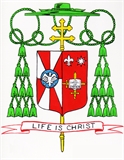
Jerome Edward Listecki
Miseration Divina et Apostolicae Sedis Gratia
Archiepiscopus Milvaukiensis
During this Year of Faith, I, the undersigned Archbishop of Milwaukee, in accord with the decree issued by the Apostolic Penitentiary, declare that the Christian faithful of the Archdiocese of Milwaukee, having fulfilled the required conditions (sacramental Confession, Eucharistic Communion, prayers for the Supreme Pontiff’s intentions) and in a spirit of total detachment from any inclination to sin, may benefit from a Plenary Indulgence on the following occasions:
• Visitation to the Cathedral of St. John the Evangelist in Milwaukee, the Basilica of St. Josaphat in Milwaukee, the Basilica at the National Shrine of Mary, Help of Christians at Holy Hill in the form of a pilgrimage. Pilgrims must participate in a liturgy, or at least pause for an appropriate time in prayer and meditation, concluding with the recitation of the Our Father, the profession of faith in any legitimate form, invocations of the Blessed Virgin Mary and, where appropriate, of the Holy Apostles or patron saints.
• Attendance at three lectures on Vatican II or the Catechism of the Catholic Church; attendance at Mass or the Liturgy of the Hours on First Fridays of the month during the Year of Faith; or visiting the place where they were baptized to renew their baptismal vows.
• Attendance at Mass celebrated by a bishop on the Year of Faith’s last day, the feast of Christ the King. Those impeded by sickness or other serious cause from attending the Mass, as long as they are truly repentant and pray while listening to the bishop bestow the indulgence via television or radio likewise receive the indulgence.
Given this 29th day of October, 2012.
To understand indulgences and the doctrine and practice of the Church, it is necessary to understand that sin has a double consequence. Grave sin deprives us of communion with God and therefore makes us incapable of eternal life, the privation of which is called the “eternal punishment” of sin. On the other hand every sin, even venial, entails an unhealthy attachment to creatures, which be purified either here on earth, or after death in the state called Purgatory. This purification frees one from what is called the “temporal punishment” of sin. These two punishments must not be conceived of as a kind of vengeance inflicted by God from without, but as following from the very nature of sin. A conversion which proceeds from a fervent charity can attain the complete purification of the sinner in such a way that no punishment would remain. - Catechism of the Catholic Church [1471]
Please click here for a printable PDF.